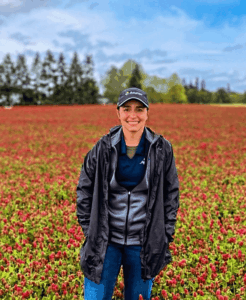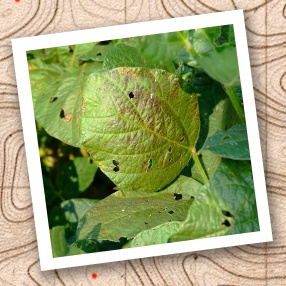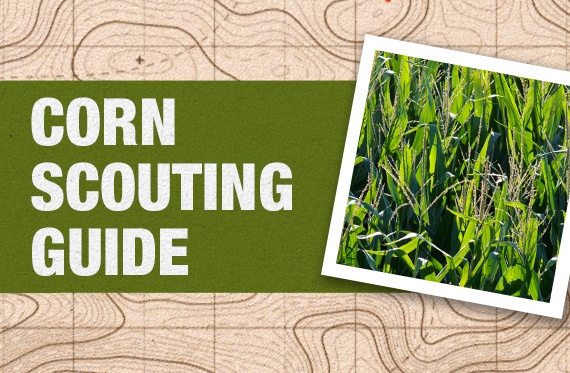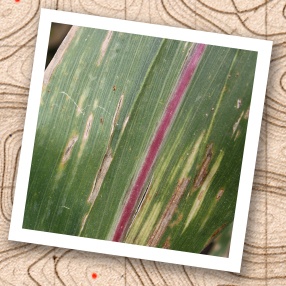
For many growers, farming is in their blood and a part of their earliest memories. Stepping into a role on the farm often means working alongside or taking over for family, who have stewarded the land for generations.
For newcomers to agriculture, the journey looks a little different. Getting started is intimidating. But passion, strategy and community can make all the difference.
That’s the case for Megan Lawrence, agronomy resource representative for technical services at Syngenta and a first-generation farmer. We recently talked to Lawrence about how she has been able to break ground on her new operation and what advice she has for aspiring growers.
Q: How did you first connect with agriculture?
A: Though I wasn’t raised on a farm, I grew up in a rural agricultural community in Kentucky. My early experiences of helping friends on their family farms, setting tobacco and baling hay, along with participating in FFA during high school sparked my passion for agriculture. Witnessing both the successes and struggles of farm families inspired me to pursue a career in this field before I set out to start my own operation.
Q: Where did your education and career take you before starting your farm?
A: My lifelong interest in plants and my love of working outdoors naturally led me to agriculture. I earned both my bachelor’s and master’s degrees in agricultural science, majoring in agronomy, from Murray State University in my home state. During my master’s program, I started working at Ag Connections, a Syngenta subsidiary. That marked the start of my journey with the company.
Since then, I’ve held various roles including AgriEdge® specialist in Kansas and technical lead in the Digital Ag Solutions research and development group. Currently, I’m a technical agronomy resource representative on the technical services team, covering the South and East Coast. Now, I live in Kentucky again, where I have family roots.
Q: What motivated you to not only work in agriculture, but start your own operation?
A: I’m fascinated by the intricate factors that affect how farmers feed the world, particularly plant diseases and insects. The challenge of applying modern knowledge and technology to agriculture excites me.
Moreover, I feel a responsibility to educate the public about food production and dispel misconceptions about agricultural technologies. I believe farmers are uniquely positioned to share this message and demonstrate responsible land stewardship.
Q: What is your operation like today?
A: My operation is in its early stages since I’ve recently returned home. I’m starting with an acre of pumpkins, both for decoration and culinary use, for fall sales at the local farmers market. We’re also planning to plant flowers like peonies, tulips and ranunculus for future farmers market sales. Long-term plans include expanding into produce and livestock as resources allow.
Q: What was it like to start your own farm?
A: The process has been incredibly fulfilling. From physical labor to problem-solving and planning, every aspect has been a learning experience. I’m doing many things manually as I start up, which has deepened my appreciation for the work involved in farming.
Starting from scratch on long-uncultivated land has been both challenging and rewarding. I’ve learned to navigate the unpredictability of weather, balance perfectionism with practicality, and accept that many factors are beyond my control. This hands-on experience has been invaluable for my work as well, providing insights that will benefit both my customers and Syngenta.
Q: What advice do you have for folks who want to get into farming?
A: Ask questions! Reach out to other farmers and utilize available resources. There are so many resources available for those who want to get started. Don’t be afraid to look for them.
Have a learner’s mentality. Be prepared for setbacks and expect a steep learning curve. This is something that’s been difficult for me, but I remind myself that every failure is another step toward success. And finding out what you don’t want to do is just as important as learning what you do want to do.
Start small and scale up gradually. It will feel like you’ve bitten off more than you can chew. Breathe and know that it’s normal! Once you’re ready to scale up, make a business plan before expanding.
Prioritize soil health from the beginning. It might seem counterintuitive to leave a field out of production for an extra year in the beginning, but taking the time to remedy the soil will serve you well in the long term.
Don’t do it alone. Network with other farmers and join agricultural groups for education and community. With that, don’t be afraid to seek multiple opinions from trusted connections you make.
Document your learnings and data for future reference. Write down the good and the bad, refer to it next year, and share it with your friends, family and community.
Consider techniques to extend your growing season. For crops like pumpkins and other vegetables, row covers or high tunnels can help accomplish this.
Practice integrated pest management from the start. Even small operations can and should pursue this route. Not only will you have peace of mind, it’ll also be much easier to adopt practices on a larger scale once you’ve set the foundation.
Most importantly, continue to educate yourself. The industry is constantly evolving, but so are we!
Q: What do you wish you knew before you started farming?
Don’t underestimate the importance of business planning and financial management. That includes understanding risks, such as inclement weather, and other factors like regulations and paperwork involved in farming and farmers markets.
Fortunately, I’ve also learned the value of community support and networking. A strong network does more than help you navigate risks and regulations. It can also help you continue your education and keep your chin up on tough days.
I also encourage potential new farmers to ask the following questions before getting started:
- Do I know and understand the local farming regulations?
- What livestock or crops suit my specific conditions?
- What regional pests and diseases do I need to consider?
- Are there local mentorship programs or Extension services?
- Do I have the startup capital I need?
- How can I diversify my revenue streams?
- What marketing channels are available?
- Can I create a sustainable crop rotation plan?
- Can I access the equipment I need to get started?
- How should I plan for off-season work or income?
Beginning farmers need to get used to expecting the unexpected, but asking the hard questions up front helps newcomers navigate challenges and enjoy the journey.

















